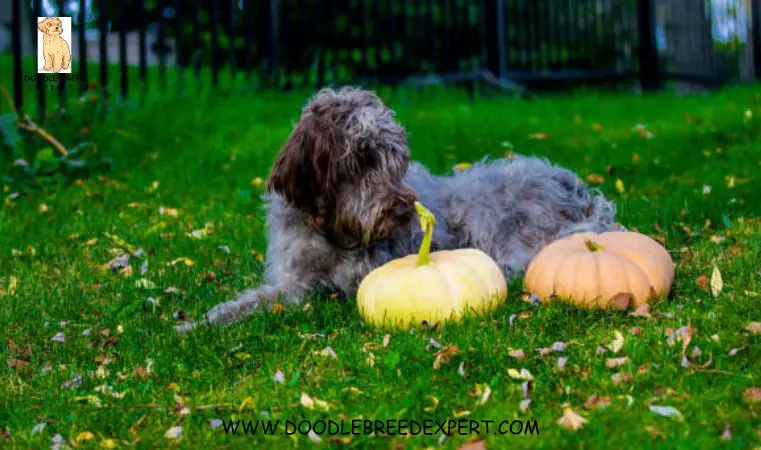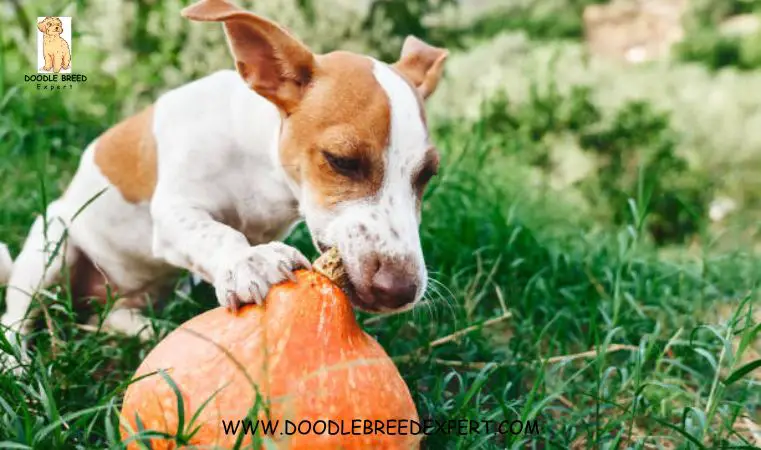Can Dogs Eat Yellow Squash? The pets are critical members of the family. Most dogs are not simply pets but beloved members of the house. More people in the U.S. have adopted pets, especially dogs, during the pandemic. National Geographic documented an 8% increase in fostered pets over the last year. Studies have shown that these furry friends help decrease feelings of loneliness and lower blood pressure. They’re bright and provide valuable companionship.
Dog lovers would want to ensure that their dogs are in good shape. One of the ways to do this is to look at what they eat. Despite their classification as carnivores, dogs are omnivores. Dogs find the consumption of plants enjoyable as well. So Can Dogs Eat Yellow Squash? Yellow Squash, among many other foods, is safe for dogs to eat as long as it is free from chemicals harmful to dogs. Want to know more if your friend with fur can munch on Squash? Well, this guide is just for you!
Can Dogs Eat Yellow Squash?
Sure! Yellow Squash is one of those vegetables that dogs can eat. Feeding it to your pet might even provide some health benefits since it is claimed to be a source of essential nutrients. Here is some information about the way yellow Squash should be cooked and why it must be a part of your pet’s meal:
Always buy from trusted sellers.
The yellow Squash should be purchased from a reliable source—not the first in people’s minds, but this can be considered safe to feed the pet. Certain types of squashes contain cucurbitacin, a compound that can be toxic once ingested. It also has harmful effects on humans and dogs, showing symptoms such as nausea, vomiting, diarrhea, stomach cramps, and dizziness. Dire conditions for growing or possible cross-pollination with the wild plants can be the reason for such an elevation in the cucurbitacin content of Squash. That’s why you must get your yellow Squash from a good source that plants it safely. Even though the said toxic squash syndrome is rare, one should avoid having it.
It has a large amount of nutrients.
Most people know the numerous health benefits vegetables offer, from the multiple essential vitamins to the minerals they contain. Based on SymptomFind, yellow Squash can pack vitamins A, B, and C, fiber, magnesium, phosphorous, manganese, and potassium. Feeding your dogs yellow Squash ensures they absorb all these nutrients, helping keep their bodies healthy. Its high fiber content supports proper organ functioning, reducing the risk of diseases and other health-related issues.
Yellow Squash: makes an excellent ingredient for any dog treat recipe made for a dog. Serve alone as a treat or with some of your dog’s dinner. Natural, canned pumpkin is a classic fix for minor doggy stomach upsets that will soothe the digestive tract. Of course, if the stomach upset persists, or your dog has eaten something out of the ordinary, contact your veterinarian immediately.
It is good if you feed your dog with Squash, which will help overweight or dieting dogs due to the high fiber content. It is always good to increase the fiber in their meal, which gives a feeling of fullness in them with the decreased calories. Consult a veterinarian if you ever decide to change your dog’s diet, especially about weight.

Hardly any effort in preparation is needed.
Another great thing about feeding your dog yellow squash is that it is prepared very quickly. All one has to do is simmer it unsalted, mash it, and serve. There is no need for extra flavor. “Salt is not toxic to dogs,” said veterinarian Dr. Tim Watson, “but like humans like a little salt, too much can be toxic.” This could lead to vomiting or even seizures in dogs. And remember that vegetables alone cannot sustain a dog, so add yellow Squash to some meat or dog food.
People worldwide who do keep pets should be responsible for their welfare. To keep dogs healthy and active, they must feed on some nutritious foods. Yellow Squash is one of the veggies with lots of benefits for your furry friend. The addition of yellow Squash to their diet helps maintain their fitness.
What Type of Squash Can Dogs Eat?
Feeding your dog squash is all about variety and how you prepare it. According to the American Kennel Club’s chief veterinary officer, Dr. Jerry Klein, Squash is fine for a dog to eat “as long as the seeds, skin, and rinds have been removed.” Dump the seeds and rinds into a secured garbage can or compost bin so your dog won’t be tempted to snatch a snack.
Dr. Klein lists the best and safest Squash for dogs, such as acorn, pumpkin, butternut, and zucchini. Among the squashes mentioned, zucchini is the type that a dog is most likely to process well. But again, as far as pumpkin is concerned, Dr. Klein warns you never to allow your dog to eat pumpkin pie filling because it contains xylitol, which is toxic and an artificial sweetener for dogs. Always give Squash to your dog in moderation and consult your veterinarian before adding it to their diet.
How to Prepare Yellow Squash for Dogs:
A veterinarian says yellow Squash can be served to a dog relatively quickly by roasting or steaming it. Dogs should be fed simple yellow Squash without butter. Avoid giving dogs yellow Squash seasoned with garlic salt, onion, or regular salt because each food item can be toxic to dogs. Please keep it simple for your dog when preparing yellow Squash without any seasoning.
Always consult a veterinarian before you consider adding a vegetable like Squash to the dog’s diet, and add it to the pet’s diet very slowly. If the dog shows any adverse reaction, discontinue feeding the food and consult a veterinarian for the way forward.
How Many Yellow Squashes Can Dogs Eat?
Treat them to something healthy, like Squash. But ensure that all these, even healthy treats, do not make up more than 10% of your dog’s daily calorie intake. The rest of the calories must be derived from a balanced diet for dogs.
Of course, the quantity of yellow Squash that a dog can take varies with the size of the dog. The little ones are all right, with just a few vegetable cubes each meal. The bigger dogs could be given a relatively more significant amount. Still, one shouldn’t be feeding vegetables in large quantities because it could upset the digestive system.
Here is the recommended daily serving of yellow Squash for dogs based on the weight of the dog:
- For tiny dogs 2-20 pounds, give one teaspoon daily. Some example breeds in this weight category include Yorkies, Chihuahuas, Pomeranians, and Pugs.
- Small dogs weighing 21-30 pounds can carry 1-2 teaspoons daily. The Basenjis, Beagles, and Miniature American Shepherd breeds can be classified under that.
- A dog weighing 31-50 pounds gives 2-3 teaspoons daily. Some examples are Basset Hounds, Border Collies, and Australian Cattle Dogs.
- Big dogs, in the range of 51-90 pounds, might consume 1-3 tablespoons daily. This includes breeds like Pit Bulls, German Shepherds, Labrador Retrievers, and Australian Shepherds.
- Giant Dog Breeds: 2–4 tablespoons of yellow Squash daily. These dogs include Newfoundlands, Bernese Mountain Dogs, Saint Bernards, and Great Pyrenees.
Read Also: Do Mosquitoes Bite Dogs?
How to Cook Yellow Squash
Yellow Squash can be cooked in various ways according to one’s preference. It tastes adorable when baked and added to meat or grain meals. You can also broil or steam it for another chew. A great choice that’s tasty for your furry friend is baked pumpkin.
Note: Some types of Squash, such as yellow Squash, can be cooked and fed to your dog once or twice a week, though in moderation and properly prepared.
Do not include seasonings such as garlic, salt, or onion, which are at very high sodium levels and are toxic to dogs; high sodium levels will worsen many processes of diseases.

Are there any other fruits and vegetables that dogs can eat?
Although dogs can have several fruits and vegetables, others are considered toxic and unfit to give to them. Cooked asparagus has little nutritional value to the dog, and raw asparagus can be chewy, thus challenging for the dog to digest.
Dog-friendly veggies include cucumbers, green beans, bell peppers, and celery. Broccoli, carrots, and cauliflower are safe, but feed cauliflower to dogs in moderation to avoid the complication of causing flatulence.
Lettuce is delicate for dogs, but pickles are one thing to be careful about because the vinegar and sodium used to make them are proven causes of allergies. Scallions are a definite no because of the potential to cause kidney problems.
Sweet potatoes or regular potatoes boiled in water, plain, and all types of peas (except canned) and boiled regular potatoes are safe for dogs as long as they are plain and without butter, pepper, or salt.
Regarding fruits, only Squash is safe; apart from bananas, apples, kiwis, and oranges, the seeds and peel should be removed. Other melons are fine but have very high levels of natural sugar, so they should be used in moderation.
Dates, papaya, and blueberries are safe, but papaya seeds must be handled carefully due to the cyanide content. It is better to avoid cherries since the seeds contain cyanide, and taking them out of the fruit isn’t easy.
Conclusion: Can Dogs Eat Yellow Squash?
Hence, in conclusion, is feeding a dog yellow Squash safe? Yes, it is safe for dogs. Yellow Squash is safe and healthy for a dog only if prepared correctly. It adds to the necessary intake of vitamins, minerals, and fiber for health and well-being.
Properly seed and skin before feeding to avoid any digestive problems. Yellow Squash can be prepared in various ways and should be given in moderation to supplement a healthy dog diet.
Just like any other new introduction of a type of food, it’s a good idea to ask your vet whether it is okay for the specific dog diet. Yellow Squash, by and large, can serve your furry friend as a healthy treat.
References:
- Ctdi, S. L. (2022, October 28). Can Dogs Eat Squash? American Kennel Club. https://www.akc.org/expert-advice/nutrition/can-dogs-eat-squash/
- Saylor, A. (2023, December 4). Can Dogs Eat Squash? PetMD. https://www.petmd.com/dog/nutrition/can-dogs-eat-squash
- May, R. (2021, February 2). Pets are helping us cope during the pandemic—but that may be stressing them out. Animals. https://www.nationalgeographic.com/animals/article/pets-are-helping-us-cope-during-the-pandemic






